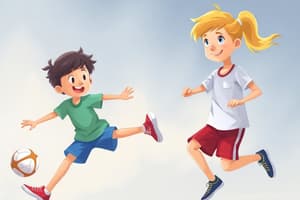Podcast
Questions and Answers
Why is regular physical activity important for children with special needs?
Why is regular physical activity important for children with special needs?
- To improve cognitive abilities (correct)
- To decrease muscle development
- To enhance social skills
- To develop visual impairments
What is NOT included in the term 'special needs'?
What is NOT included in the term 'special needs'?
- Perfect physical fitness (correct)
- Intellectual disabilities
- Developmental delays
- Cerebral palsy
How do team sports help children with special needs?
How do team sports help children with special needs?
- By enhancing hearing impairments
- By decreasing cognitive abilities
- By causing physical disabilities
- By improving social skills (correct)
Which of the following is a benefit of physical education for children with special needs?
Which of the following is a benefit of physical education for children with special needs?
Why are group activities important for children with special needs?
Why are group activities important for children with special needs?
How does exercise benefit the cognitive functions of children with special needs?
How does exercise benefit the cognitive functions of children with special needs?
How can participation in sports benefit children with special needs?
How can participation in sports benefit children with special needs?
What is a key strategy for adapting physical education programs for children with special needs?
What is a key strategy for adapting physical education programs for children with special needs?
How can assistive technology be helpful in physical education for children with special needs?
How can assistive technology be helpful in physical education for children with special needs?
What role does peer pairing play in helping children with special needs in physical education?
What role does peer pairing play in helping children with special needs in physical education?
How can adaptive equipment assist children with special needs in sports?
How can adaptive equipment assist children with special needs in sports?
Why is it important to make instructional modifications for children with special needs in physical education?
Why is it important to make instructional modifications for children with special needs in physical education?
Flashcards are hidden until you start studying
Study Notes
Physical Education and Sports for Children with Special Needs
Every child deserves the opportunity to learn, grow, and thrive through physical education and sports. Yet, for children with special needs, this journey can come with unique challenges and considerations. In this article, we'll explore the world of physical education (PE) and sports for children with special needs, offering a factual overview and practical insights.
Defining Special Needs
To begin this discussion, we must clarify the term "special needs." Special needs encompass a wide range of diagnoses and conditions, including but not limited to:
- Intellectual disabilities
- Developmental delays
- Autism spectrum disorders
- Cerebral palsy
- Visual or hearing impairments
- Physical disabilities
The Benefits of Physical Education and Sports
Physical education and sports provide numerous benefits for children with special needs, including:
- Improved physical fitness and health: Regular physical activity can lead to better cardiovascular health, stronger muscle development, and increased mobility.
- Enhanced social skills and communication: Team sports and group activities help children with special needs learn important social skills, such as empathy, sharing, and problem-solving.
- Improved cognitive abilities: Exercise stimulates blood flow to the brain, which can enhance cognitive functions such as memory and attention.
- Increased self-esteem and confidence: Participation in sports can help children with special needs develop a stronger sense of self-worth and confidence in their abilities.
- Reduced stress and anxiety: Physical activity can help lessen feelings of stress and anxiety, promoting a more relaxed and positive demeanor.
Adapting Physical Education and Sports for Children with Special Needs
To ensure that children with special needs can fully participate and succeed in physical education and sports, it's essential to make appropriate accommodations. Here are some strategies for adapting programs:
- Individualized goals: Set realistic and achievable goals for each child, taking their unique strengths, weaknesses, and needs into account.
- Instructional modifications: Modify instructions and teaching methods to better suit the child's learning style and abilities.
- Use of assistive technology: Employ assistive technology, such as visual cues or electronic devices, to help children with special needs understand and perform physical activities.
- Partner pairing: Assign a peer or buddy to work one-on-one with a child with special needs, providing support, encouragement, and guidance during activities.
- Adaptive equipment: Use adaptive equipment, such as specialized shoes, wheelchairs, or sports aids, to help children with special needs participate and succeed in sports.
Conclusion
Physical education and sports provide invaluable benefits for children with special needs, helping them build stronger physical, cognitive, and social skills. By tailoring programs to meet the unique needs of each child, educators and coaches can ensure that all children have the opportunity to learn, grow, and thrive through physical education and sports.
Studying That Suits You
Use AI to generate personalized quizzes and flashcards to suit your learning preferences.




